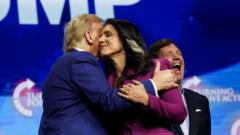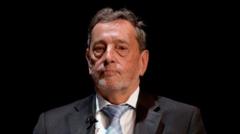
Donald Trump’s potential second-term team reveals a complex landscape of competing agendas and loyal supporters, divided into four distinct factions that offer insights into his potential governance approach.
Deep State Disruptors
This group includes Matt Gaetz, Tulsi Gabbard, and Robert F. Kennedy Jr., who are known for challenging established political narratives. Gaetz, Trump’s attorney general nominee, is a controversial figure who led Kevin McCarthy’s removal from the House Speaker position. Gabbard, nominated as national intelligence director, is a former Democratic congresswoman who has frequently criticized American foreign policy. Kennedy, tapped to oversee health, is known for spreading controversial theories about vaccines and technology.
These individuals share a common trait of aggressively challenging the status quo, often veering into conspiracy territory. They may be instrumental in Trump’s plan to dismantle the bureaucratic “deep state” by targeting law enforcement, intelligence, and health sectors. However, their unconventional views might create internal tensions, as their individual agendas may not always align perfectly with Trump’s broader objectives.
Border Hardliners
Tom Homan, Stephen Miller, and Kristi Noem represent the administration’s tough stance on immigration. Their agenda focuses on strengthening border security and increasing deportations, particularly targeting individuals considered national security or public safety risks. This approach resonates with voters who cited immigration as a primary concern, though it could potentially create conflicts with Democratic-leaning states and jurisdictions.
Tech Libertarians
Elon Musk and Vivek Ramaswamy lead the “Department of Government Efficiency,” representing a tech-driven approach to government restructuring. They advocate for significant spending cuts, with Musk proposing potential $2 trillion reductions. Their appointment acknowledges their campaign support, but the department’s actual impact remains uncertain, given Trump’s mixed record on fiscal discipline.
China Hawks
Marco Rubio, Mike Waltz, and John Ratcliffe comprise the foreign policy team focused on confronting China. They view Beijing as the primary economic and security threat, advocating for higher tariffs and aggressive diplomatic strategies. Rubio, nominated for secretary of state, is particularly critical of Chinese policies.
This group’s hawkish stance might create internal tensions, as Trump has historically displayed an inconsistent approach to China – simultaneously implementing trade wars and praising President Xi Jinping.
Overall, Trump’s team reflects a diverse range of perspectives united by loyalty to him. The appointments suggest an administration prepared to challenge established political norms across multiple domains, from domestic policy to international relations. However, the potential for internal disagreements and conflicting agendas could pose significant leadership challenges.
The team’s composition indicates Trump’s intention to disrupt traditional governmental approaches, potentially reshaping American political and diplomatic landscapes in his potential second term.








